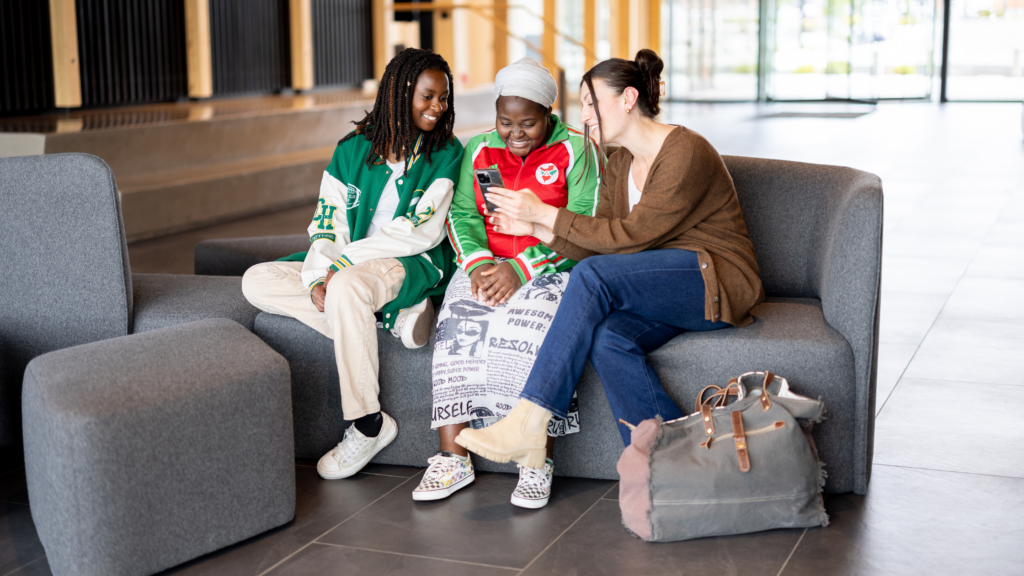Beyond the Odds
Understanding the unique challenges faced by first-generation college students is essential. These students often face a steeper and more uncertain college path than their peers from college-educated families. By understanding their demographic makeup, barriers, and needs, we can effectively address educational inequity and provide the necessary support for these students in their pursuit of success.
This blog highlights who first-generation college students are, their educational disparities, and why this demographic is critical to fostering a more diverse, innovative, and prosperous society. We will also explore how educators, mentors, and program directors can provide meaningful support and mentorship for these students, helping break down systemic barriers and build pathways to success.

Who Are First-Generation College Students?
First-generation college students, a group that includes individuals from low-income households, underrepresented racial and ethnic groups, and immigrant families, are defined by their resilience and determination. They are the embodiment of the American dream, striving for a better future despite the unique pressures they face in a system that may not always account for their experiences.
A recent study reveals that FGCS represent over 20% of the student population in U.S. colleges and universities. This diverse group spans different races, ethnicities, and socio-economic backgrounds. While each student’s story is distinct, many face similar obstacles in achieving their educational goals, from feeling isolated on campus to lacking the family support that is often a significant source of encouragement for continuing-generation students.

The Unique Challenges FGCS Face in College
The challenges faced by first-generation college students are multi-dimensional, encompassing academic and social barriers that can impact their chances of completing their degrees.
Struggle with Belonging and Self-Identity
Many FGCS experience a lack of belonging, feeling like outsiders within the college environment. In fact, research has shown that FGCS are more likely to struggle with finding their place on campus and often feel left out of the social and academic networks that are vital for college success (Stephens, Hamedani, & Destin, 2014). This lack of integration can be exacerbated by perceptions of a hostile climate, negative interactions with faculty, and limited cross-racial communications, all of which can weaken a student’s academic self-concept and sense of belonging, potentially leading to higher dropout rates (ASHE, 2013, p. 51).
Family and Cultural Ties
One of the most complex aspects of being a first-generation student is navigating the conflicting expectations of family and academia. FGCS may feel pulled between their family’s values and responsibilities and the demands of their college experience. Many first-generation students struggle to distance themselves from family expectations, leading to unintentional estrangement from campus peers with different family dynamics. According to Boden (2011), this conflict often limits FGCS from fully engaging in college life, as they may feel torn between their cultural identity and the perceived expectations of college culture.
Lack of Family Support
For many FGCS, family support is either minimal or non-existent. Some low-income families view college as a “luxury” for the wealthy, seeing their child’s ambition as unrealistic or even arrogant (Korsmo, 2014). Additionally, even parents who encourage their children’s pursuit of higher education may not fully understand the demands and dedication required for college success, leading to insufficient emotional support and misunderstandings about the academic focus necessary to thrive. Research by Sparkman, Maulding, and Roberts (2012) highlights how FGCS, lacking a solid support network, may feel pressure to take a lighter course load or consider dropping out.

National Education Trends Impacting First-Generation Students
Systemic factors in the American education landscape contribute significantly to the challenges FGCS face.
Barriers to Access
The rising costs of higher education and increasingly complex application processes place FGCS at a disadvantage. Without experienced family members to guide them through these hurdles, many FGCS feel overwhelmed and underprepared. For example, only 27% of first-generation students receive assistance with financial aid applications, compared to 57% of students with college-educated parents (Pell Institute). This lack of guidance can result in missed financial aid opportunities and increased student loan debt, further discouraging FGCS from pursuing or completing their degrees.
Supportive High School Programs
High school programs that prepare students for college are essential in setting FGCS up for success. Research has shown that FGCS who participate in college-readiness programs and make connections with school professionals are more likely to succeed in higher education (Hudley et al., 2009). These programs help students develop academic skills, build social confidence, and connect with like-minded peers who share similar aspirations, making the transition to college more manageable and less isolating.

The Role of Educational Equity and Support Programs
Recognizing and addressing the specific needs of first-generation students is essential to fostering equity in higher education. Fortunately, several programs are paving the way.
TRIO and AVID Programs
Federally funded initiatives like TRIO and AVID provide targeted support for FGCS, offering college preparation, tutoring, and application guidance (Pitre & Pitre, 2009, p. 96). These programs have a significant impact, as they introduce FGCS to financial aid information, college entrance requirements, and social skills essential for college life. Programs like TRIO and AVID empower FGCS to feel more capable and confident in pursuing their goals by easing the transition from high school to college.
Culturally Competent Programs
Many colleges now offer programs that focus on the specific needs of FGCS from minority backgrounds, such as culturally competent mentorship initiatives. According to Stephens, Hamedani, and Destin (2014), these programs are vital because they affirm the belief that “people who have backgrounds like theirs deserve to attend college and can thrive there” (p. 944). Tailored interventions addressing diverse achievement motivations help FGCS navigate challenges specific to their backgrounds and provide the psychological support needed to persevere.

Why This Matters—The Broader Impact on Society
Supporting first-generation college students is about more than helping individual students succeed; it is about fostering a more equitable and innovative society.
Economic and Social Implications
When first-generation college students succeed, the benefits ripple outward, enriching workplaces and communities with their fresh perspectives and drive for change. Their success contributes to a more diverse and inclusive workforce, fostering innovation and economic growth. As they build careers and become leaders in their fields, these students help break the cycle of poverty in their families and inspire others from similar backgrounds to pursue higher education.
Education as a Driver of Social Mobility
Education has long been considered the “great equalizer,” a path to social mobility and economic stability. For FGCS, completing a college degree can open doors to opportunities that would otherwise remain closed. By supporting these students, we help build a more equitable society where individuals from all backgrounds have a fair chance to succeed and contribute meaningfully to their communities.

How We Can Help—The Path to a Brighter Future for FGCS
To make a lasting impact, we must go beyond identifying challenges and actively invest in solutions that support FGCS.
Importance of Mentorship and Resources
Programs and resources that offer mentorship, academic guidance, and financial literacy training can make a transformative difference. Mentorship connects FGCS with individuals who understand their challenges and can provide advice, encouragement, and resources. Additionally, simplifying the college application process and offering financial literacy education can help FGCS make informed decisions, reducing the financial and emotional strain associated with pursuing higher education.
iLevelUp: A Comprehensive Solution for First-Generation College Students
One promising initiative dedicated to supporting FGCS is the iLevelUp app. iLevelUp empowers first-generation college students by providing comprehensive resources, personalized guidance, and a strong community network. We aim to bridge the gap in post-secondary education attainment, enabling students to achieve academic success and fulfill their full potential.
We prioritize serving youth who are first-generation higher education seekers across the United States, with a special focus on those facing marginalization, such as individuals from low-income backgrounds, racial and ethnic minorities, and immigrant families. Through iLevelUp, FGCS can access tailored mentorship, tools to sharpen their academic skills, financial literacy resources, and career planning support. Networking opportunities and innovative technology integration further enhance their educational journey, making iLevelUp a valuable resource that equips FGCS to overcome unique challenges.
By addressing both the academic and emotional needs of FGCS, iLevelUp provides a holistic approach to success, guiding these students from the college application process through to graduation and beyond. As an upcoming resource designed to bridge educational equity gaps, iLevelUp is poised to be an invaluable asset for first-generation students.

From Obstacles to Opportunities
Supporting first-generation college students is an investment in our collective future. By addressing the unique challenges these students face, we can create a more equitable education system that values diversity, fosters innovation, and provides opportunities for all. Let us champion the success of FGCS by offering mentorship, financial literacy education, and accessible application resources to pave a smoother path to college.
If you believe in the power of education to transform lives and create positive change, consider supporting initiatives like iLevelUp. Together, we can empower first-generation students to overcome barriers, achieve their dreams, and shape a brighter, more inclusive future for us all.Visit https://believeinme.org/iLevelUP to learn about how you can get involved.


